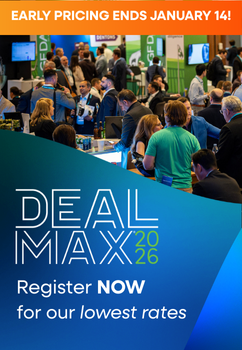
By Evan Bennitt, Head, BMO Sponsor Finance Canada at BMO Financial Group

For many private equity industry players, the last several years have felt more uncertain than any period in recent memory. While middle market merger and acquisition activity levels bounced back dramatically post-pandemic, we now find ourselves in a dynamic and complex environment characterized by geopolitical volatility, persistent inflation, higher interest rates and softening consumer demand. These and other factors are making it much more challenging to consummate an M&A transaction.
It was against this backdrop that I served as the moderator for a discussion on the current M&A environment with four private equity leaders at last year’s ACG Capital Connection conference in Toronto. We explored strategies for successfully investing in the current market, bridging gaps in valuation expectations, and creating value during periods of volatility and uncertainty.
Our panelists for this discussion were: ·
- Joseph Lo, Partner, Sagard Private Equity Canada
- Jennifer Pereira, Managing Director and Group Head, Private Equity, Fengate Asset Management
- Greg Mashinter, Partner, Peloton Capital Management
- Jamie Cartwright, Partner, Novacap
Following are key excerpts from our conversation.
The art of saying ‘no’
After several years of robust growth in deal making activity, the last 12 to 18 months have been marked by a transition to what is expected to be a “higher for longer” interest rate environment, persistent inflation and heightened macroeconomic uncertainty. Canadian mid-market private equity deal volume has slowed (although it has showed signs of increased activity in recent months) and quality of deals has been inconsistent. From a dealmaking perspective, prioritizing your efforts to focus on attractive opportunities is crucial to navigating the current environment, as Cartwright explained.
“From a sourcing perspective, there's still a lot of pursuable deal flow. There are a lot of opportunities out there,” Cartwright said.
“There are a number of good deals, but you have to hunt for them, and it means quickly saying no to the ones that don’t fit. Being more disciplined about looking at things and turning them down earlier in processes frees up time to focus on the attractive deals that are out there.” Cartwright added that Novacap has become even more stringent in its due diligence process. “Our process hasn't changed; we're just digging in harder and taking a little bit longer to do it,” he said. “When you find something in your diligence, now you ask the company to fix it, or you adjust the price, or you find a way to move along with it. You have to act a little bit more robustly on the information that you find. That may mean a deal breaks or it may mean that the diligence drags for a couple more months while you wait for more financial information or complete additional diligence.”
Peloton has also remained highly selective and disciplined when considering new opportunities. Part of it, Mashinter said, is because valuations haven’t reset to reflect the current realities. "If you think about the increase in base rates that we've seen—475 basis points over a 15-month period—the cost of capital is obviously a lot more expensive, while our return thresholds have not changed,” he said. “So, if you're not seeing that reset in valuations, it creates a much sharper focus around how you're going to create value, both as you're evaluating new opportunities, but also with your existing portfolio companies. For us this year, we have stayed focused on sectors that we know well, that we have long-term conviction around, and that we know we can add value over time regardless of what the macro environment might be over the next 12 months.”
Another advantage of a disciplined approach is that it can help further distinguish your firm from other capital providers. “Setting yourself up as the best partner for a potential target is really important, and that requires discipline and focus, and understanding what you’re good at within your firm,” Lo said.
“We try to partner with an operating executive in the sector very early to build conviction” Pereira said. “When assessing a deal, one of the first questions we seek to answer is are there multiple ways to win, and as we progress our work, we seek to prioritize and size the levers and form a view on execution risk. We also try to be very thoughtful on how we can best leverage our networks to support value creation.”
Value creation Given increased macroeconomic uncertainty and the higher cost of capital, it’s become more challenging to forecast how a business will perform over the next three to five years. And this challenge is further compounded by the widening bid-ask spread in the market. For Fengate, that means employing a couple of key strategies, as well as taking advantage of current market dynamics.
“We are seeing more earnouts, where up to 20% of the purchase price is delayed so that we're aligning performance with valuation and share the risk,” Pereira said. “We've also been increasingly focused on the management team rollover because that's a fantastic way to build that alignment and share the risk. Another thing that's swung in our favor is EBITDA adjustments. Two years ago, we were seeing more aggressive add backs to EBITDA that buyers were willing to pay for, and lenders were willing to underwrite it. That is shifting. Being able to go back to the table and say this is not going to work with the lenders, that we can't accept these performance adjustments, has helped us maintain the multiple but from a more reasonable base.”
Along with making it more challenging to measure future performance, the higher interest rate environment has led investors to focus more on establishing a robust value creation plan. As Cartwright put it: “If you can’t successfully execute against your value creation plan, you’re not going to make money on that deal.”
Cartwright explained that the value creation process involves understanding several key issues, including:
- How current strategies and tactics will drive value
- What financial and time investments are involved
- Who’s in charge of key initiatives ·
- Ensuring there are regular check-ins to assess if benchmarks are being met
“The way we create value has changed,” Cartwright said. “We used to generate substantial value from free cash flow generation. Higher interest rates now consume a higher proportion of free cash flow, so we’ve got to find value in other places. We're leaning more heavily on tools we may not have used before.” As Cartwright explained, Novacap has used data analytics heavily over the last five years to help determine where something adds value. For instance, Novacap and its portfolio company recently worked closely with its accounting partner to analyze two years of online sales data against its online advertising campaigns. The data clearly showed which programs worked and which didn’t. “It was a real eye opener to go the team and say, you can spend money to advertise and promote something but still sell less of it,” Cartwright said. “This is an example of a value creation tool that we are bringing to the table in other portfolio companies as well to find different ways to drive value, save money, drive new sales, whatever it might be.”
Just as important as value creation, Lo pointed out, is value preservation. “We look at both sides of that spectrum, and that starts with due diligence and carries on post-deal,” he said. “You can’t have one without the other. You can’t have a deal without that plan well articulated with clear eyes at the outset.”
Opportunity out of adversity
Although the industry finds itself in a difficult moment, the panelists agreed that the current challenges will ultimately lead to a stronger private equity space that's better positioned for the future.
This is a market where careful selection and a strong diligence and analysis process will be key to success. “It's putting some of the rationality back into what we're doing,” Pereira said. “I think it's a really good thing, and I'm optimistic about investing next year.” “At Sagard, we characterize ourselves as realists first and optimists second,” Lo said. “The good news is we’re investing out of the 2021 vintage, so we’re glad we have more time to be really cautious, buy well and buy smart. The opportunity to dive in more and have a little more time to take a breath will benefit our investment team.”
As Mashinter noted, many of the challenges ahead are daunting, including economic uncertainty and geopolitical instability. Nonetheless, he believes private equity sponsors are well-equipped to navigate such turmoil.
Taking a disciplined approach while focusing resources on the sectors you know well and can add value is key to successfully navigating these challenging times. This entails incorporating a more stringent due diligence process, taking your time, creating a robust value creation plan, and using creative deal structuring to align management and share risk.
“It's hard not to be nervous about what's to come,” Mashinter said. “But from a private equity perspective, these are the dislocations that create great opportunities for us to find good assets and generate a lot of value. If you can look past the short-term volatility that we're going to continue to experience, there are still tremendous opportunities. This is our time to truly add value and help founders and management teams achieve the growth they've envisioned for their businesses.”

Register by January 14 to maximize value, elevate your experience, and get a head start connecting with 3,200+ dealmakers and executives.
